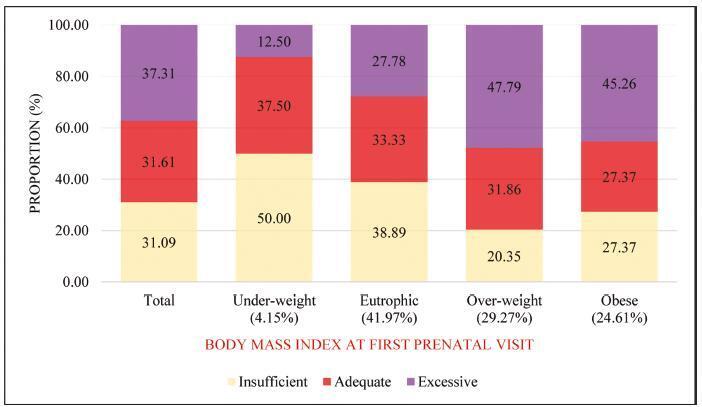Revista Brasileira de Ginecologia e Obstetrícia. 2020;42(6):316-324

To evaluate the influence of health-related behaviors including food intake, physical activity, sleep time, smoking habits, stress, depression, and optimism on excessive gestational weight gain (GWG) among women with overweight and obesity.
A cross-sectional study was conducted at the Women’s Hospital of the Universidade de Campinas, Campinas, state of São Paulo, Brazil, with 386 mediate postpartum women that fit the inclusion criteria of ≥ 19 years old, first prenatal care visit at or before 14 weeks, and single live baby. Dietary habits, physical exercise practice, sleep duration, smoking and alcohol habits were self-reported. Psychosocial history was evaluated using the Edinburgh Postpartum Depression Scale (EPDS), Perceived Stress Scale (PSS), and Life Orientation Test-Revised (LOT-R). Sociodemographic, obstetric, anthropometric, and neonatal data were retrieved from medical records. Descriptive statistics and stepwise logistic regression were performed.
The prevalence of overweight and obesity was 29.27% and 24.61%, respectively, according to the body mass index (BMI). Excessive GWG was observed in 47.79% of women with overweight and in 45.26% of women with obesity. Excessive GWG among overweight and obese women was associated with inadequate vegetable and bean consumption (odds ratio [OR] = 2.95, 95% confidence interval [CI]: 1.35-6.46 and OR = 1.91; 95%CI: 1.01-3.63, respectively) and stress (OR = 1.63; 95%CI 1.01-2.64). After adjustment by maternal age, multiparity, sleep duration, smoking, and alcohol intake, we found that stress (PSS ≥ 20) was associated with excessive GWG in women with overweight or obesity (OR: 1.75; 95%CI: 1.03-2.96).
Among women with overweight and obesity, stress is the main variable associated with excessive GWG. Inadequate vegetables and beans consumption also showed association with excessive GWG.
Search
Search in:


Comments